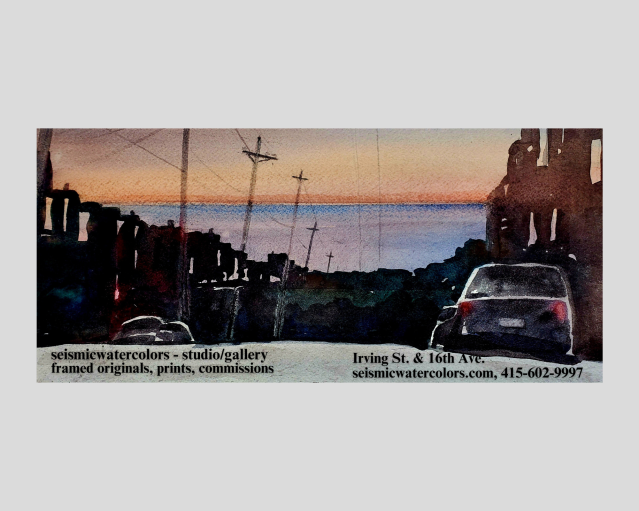During Lockdown, Former ACT Director Writes Book, Designs Course
By Joe Castrovinci
If you live in San Francisco, there’s a good chance you have heard of, or maybe even seen or met, Richmond District resident Carey Perloff.
For 25 years, she served as artistic director at the American Conservatory Theater (ACT), the Bay Area’s premiere acting company. But that is just part of her story. She is also a playwright, producer, author and teacher. While ACT director, she is the person who brought the company back from disaster after the 1989 Loma Prieta earthquake all but destroyed its Geary Street theater and saddled it with an enormous debt.

Clearly, Perloff is no stranger to challenges. But when San Francisco went into COVID lockdown on March 17, 2020, she faced a challenge of a different sort: “What do you do if you’re a theater director and there’s no theater?” she asked. “If, in fact, there’s nothing live at all, and there may not be anything live for a long, long time?”
Fortunately, Perloff came up with a great answer to that question. On the day the lockdown began, she pulled a lifetime’s worth of correspondence off the shelf and begin working on a book about two titans of modern literature whom she knew well: Harold Pinter and Tom Stoppard. Her new book, “Pinter and Stoppard: A Director’s View,” hits stores – and Amazon – on Feb 24.
While working on the book, Perloff also found time to prepare a course on directing, which she will present at San Francisco’s Osher Lifelong Learning Institute (OLLI) from Jan. 18 to Feb. 15. OLLI is a non-profit that offers education and social activities for people over 50.
Why these two projects?
“I knew the lockdown would create a difficult time for all of us, and not just because of COVID,” Perloff said. There’s Trump, ‘fake news,’ inflation, January 6, climate collapse, ‘Stop the Steal’ – the list is endless. Fortunately, we have a tool that can help us survive times like ours: great literature. Watching artists wrestle with big, tough issues can guide us through the difficult choices we have to make in our own lives.”
For her course at OLLI, for example, Perloff chose several works that hit home now. One, “The Glass Menagerie,” is perfect for a time of conflict because it wrestles with the struggle between tradition and innovation. In the play, Perloff explained, the longing for tradition is personified by Amanda, who holds on to the past, and innovation by her son Tom, who is driven to break out in new directions – even if that choice harms his loved ones.
Another work featured in the class is “A Thousand Splendid Suns,” a timely choice as the world continues to wrestle with the rights of women and girls. The play is based on a novel by Khaled Hosseni, author of “The Kite Runner,” and looks at three generations of Afghan women in uniquely turbulent times – the years after the Soviet invasion and the Taliban takeover, an era that has tragically come back to haunt us.
Then there’s “The Voysey Inheritance,” the story of a man who discovers that his family’s business has knowingly defrauded people for years, even as it has given generously to philanthropic causes. It hits home today, Perloff explained, in the time of ultrawealth, the Enron and real estate collapses, the oxycontin crisis and the Sackler family, and charges of money laundering leveled at prominent leaders, up to and possibly including a former president.
Perloff’s new book,”Pinter and Stoppard: A Director’s View,” also sheds light on the how literature can help us survive difficult times. Both writers faced enormous hardships in childhood: Stoppard fled his homeland, Czechoslovakia, in 1938 as the Nazis invaded, and later lost almost his entire family at Auschwitz. Pinter lived through World War II, the Blitz, and a threatened Nazi invasion of Great Britain. After the war, Pinter, who like Stoppard was Jewish, confronted a wave of antisemitism and violence that left a significant mark on his work. Yet at the same time, Pinter, like Stoppard, was remarkably resilient and found endless solace in the act of writing.

“Pinter and Stoppard” gives Perloff a chance to share with us what she learned from working with both artists while directing their work. Above all, she explained, they believed that art can keep us sane, help us make difficult choices – and, in an age of supposed “fake news,” save culture and language from destruction and debasement.
The commitment that both playwrights felt to literature and art was best described by a third writer, Amos Oz, who said this of his own life: “When I was little, my ambition was to … be a book. Not a writer. People can be killed like ants. Writers are not hard to kill either. But not books … however you try to destroy them, there is always a chance that a copy will survive … in some … out-of-the-way library….”
Readers of Perloff’s new book will see first-hand why great literature matters, and how two literary giants can open our minds and rekindle our imaginations in difficult times.
Categories: author











